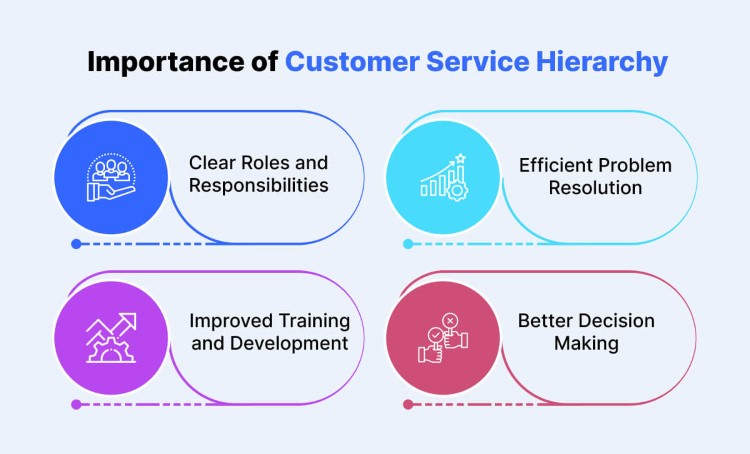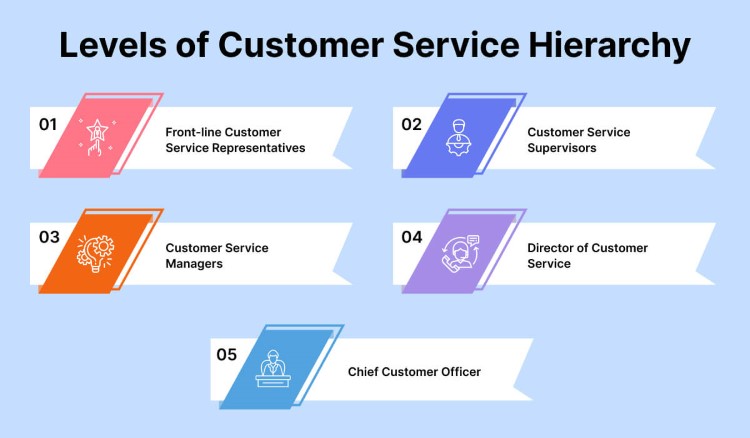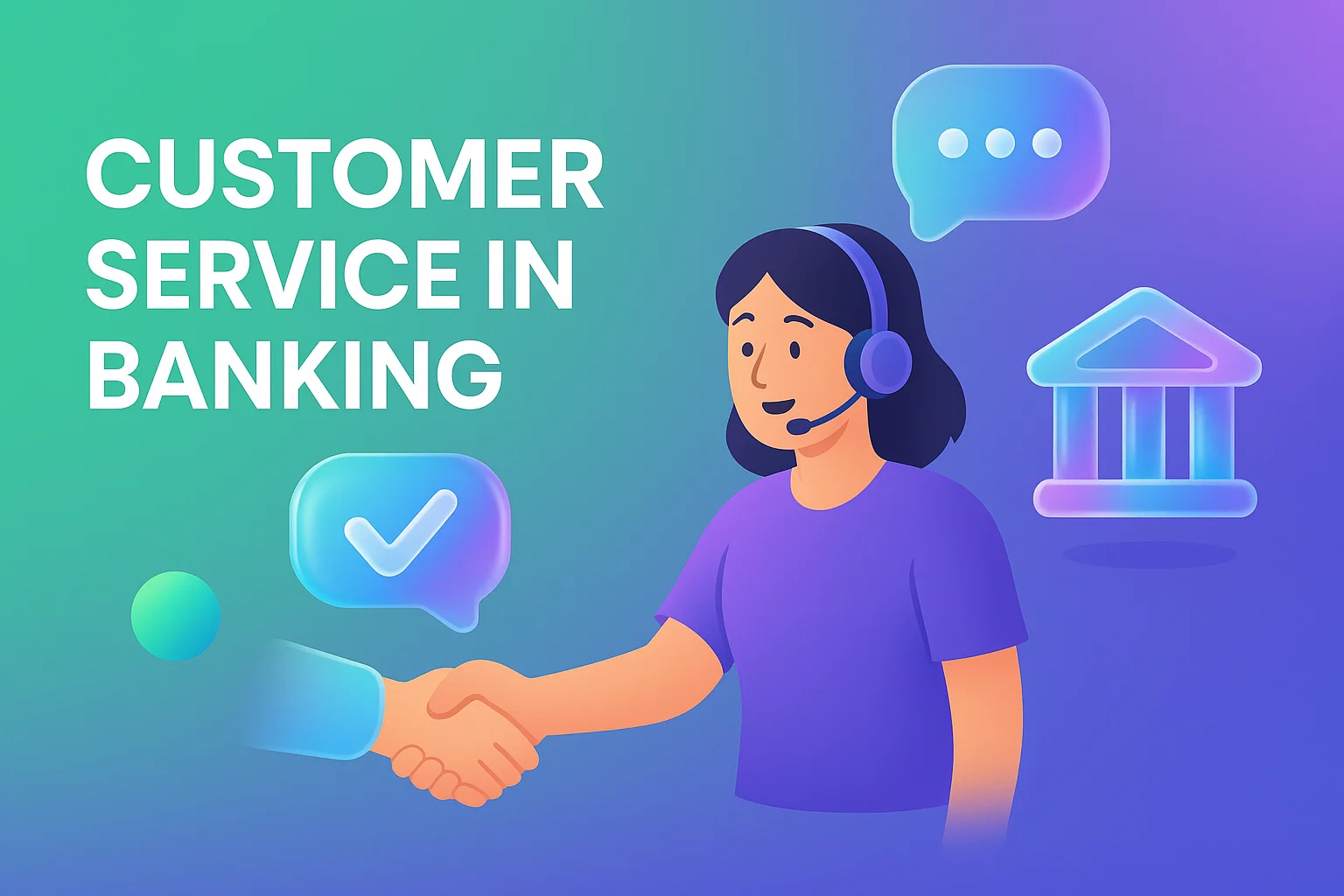Explore the 5 Levels of the Customer Service Hierarchy
- May 3, 2023
- 7 mins read
- Listen

Customer service has become a critical differentiator for companies looking to build customer loyalty and drive growth. A well-structured customer service hierarchy can ensure that customer inquiries and issues are handled in a consistent and efficient manner, while also providing opportunities for employee development and advancement.
In this blog post, we will explore the different levels of a customer service hierarchy, their roles and responsibilities, and why it’s important for companies to invest in effective customer service.
What is Customer Service Hierarchy?
Customer service hierarchy refers to the organizational structure of a company’s customer service department, which outlines the levels of responsibility, authority, and expertise required for different positions within the department.
It helps ensure that customers receive effective and efficient support by assigning tasks and responsibilities to the appropriate individuals based on their experience, skill, and knowledge level.
Each level of the hierarchy has its own roles and responsibilities, and individuals are expected to work collaboratively to provide the best possible customer experience.
Importance of Customer Service Hierarchy

The importance of customer service hierarchy lies in its ability to provide structure and clarity within a company’s customer service department.
Here are some specific reasons why a well-defined hierarchy is essential for effective customer service:
- Clear Roles and Responsibilities: By outlining the roles and responsibilities for each level of the hierarchy, it becomes easier for customer service representatives to understand their job duties and expectations. This clarity helps to ensure that all customer inquiries and issues are handled in a consistent and efficient manner.
- Efficient Problem Resolution: With a defined hierarchy in place, customer service representatives can escalate complex or unresolved issues to their supervisors or managers, who have the knowledge and authority to resolve the issue quickly and effectively. This helps to ensure that customer problems are resolved in a timely manner, increasing customer satisfaction and loyalty.
- Improved Training and Development: It provides a clear path for career growth within the customer service department, allowing employees to understand what skills and knowledge they need to acquire to advance to higher positions. This, in turn, helps to improve employee satisfaction and retention rates.
- Better Decision Making: As customer service issues become more complex, decisions must be made at higher levels of the hierarchy. Having a clear hierarchy in place ensures that decisions are made by individuals with the appropriate level of expertise and authority, leading to more informed and effective decision-making.
5 Levels of Customer Service Hierarchy

A customer service hierarchy is a system that outlines the different levels of employees responsible for handling customer inquiries and issues within an organization.
By implementing a well-structured customer service hierarchy, companies can ensure that customer inquiries are handled efficiently and effectively, leading to increased customer satisfaction and loyalty.
Let’s take a deep insight into the 5 levels of the customer service hierarchy.
Level 1: Front-line Customer Service Representatives
These employees interact directly with customers on a day-to-day basis, handling inquiries, complaints, and issues. Their roles and responsibilities include:
- Answering customer inquiries and providing information about products or services
- Resolving customer complaints and issues in a timely and effective manner
- Providing technical support and troubleshooting for customers
- Documenting customer interactions and issues in a customer relationship management (CRM) system
- Escalating complex or unresolved issues to their supervisors or managers
Level 2: Customer Service Supervisors
These employees oversee a team of front-line customer service representatives, ensuring that they are meeting performance targets and providing excellent customer service. Their roles and responsibilities include:
- Monitoring the performance of front-line customer service representatives and providing coaching and feedback to improve performance
- Handling escalated customer complaints and issues
- Ensuring that all customer inquiries and issues are handled in a consistent and efficient manner
- Creating and maintaining training programs to develop the skills and knowledge of front-line customer service representatives
Level 3: Customer Service Managers
These employees oversee a team of customer service supervisors and are responsible for the overall performance of the customer service department. Their roles and responsibilities include:
- Setting performance targets for the customer service department and ensuring that they are met
- Developing and implementing customer service policies and procedures
- Analyzing customer data to identify trends and areas for improvement
- Managing budgets and resources for the customer service department
- Providing regular reports on the performance of the customer service department to senior management
Level 4: Director of Customer Service
This role is responsible for the strategic direction of the customer service department and works closely with senior management to align customer service goals with overall business objectives. Their roles and responsibilities include:
- Developing long-term customer service strategies and goals
- Leading cross-functional initiatives to improve the customer experience
- Managing relationships with key customers and stakeholders
- Analyzing market trends and customer needs to identify opportunities for growth
- Providing regular reports on the performance of the customer service department to senior management
Level 5: Chief Customer Officer
This role is responsible for the overall customer experience and works to create a customer-centric culture across the entire organization. Their roles and responsibilities include:
- Leading the development and implementation of customer experience strategies and initiatives
- Ensuring that all customer touchpoints are optimized to provide a seamless and positive experience
- Managing customer feedback and using it to drive continuous improvement
- Building and maintaining relationships with key customers and stakeholders
- Providing regular reports on the overall customer experience to senior management
Each level in the customer service hierarchy is critical in providing excellent customer service, resolving customer issues, and building customer loyalty. By working together, these individuals can create a customer-centric culture that drives business success.
Companies With Effective Customer Service Hierarchies
There are many companies that are known for their effective customer service hierarchies. Here are a few examples:
1. Zappos
Zappos is an online retailer that is famous for its exceptional customer service. The company has a customer service hierarchy that includes front-line customer service representatives, supervisors, managers, and a director of customer loyalty.
Zappos is known for its customer-centric culture, which encourages employees at all levels to go above and beyond to provide excellent customer service.
2. Apple
Apple is known for its sleek and innovative products, but it is also recognized for its excellent customer service. Apple has a customer service hierarchy that includes front-line customer service representatives, supervisors, managers, and a senior director of customer experience.
The company is known for its focus on customer satisfaction and has been ranked highly in customer satisfaction surveys.
3. Ritz-Carlton
The Ritz-Carlton is a luxury hotel chain that is known for its exceptional customer service. The company has a customer service hierarchy that includes front-line employees, supervisors, managers, and a vice president of global brand training and standards. The Ritz-Carlton is known for its “Gold Standards,” a set of service principles that all employees are trained to follow.
4. Amazon
Amazon is an e-commerce giant that has built its reputation on fast and reliable shipping and excellent customer service. The company has a customer service hierarchy that includes front-line customer service representatives, supervisors, managers, and a director of customer service.
Amazon is known for its focus on the customer experience and has invested heavily in customer service technology to improve efficiency and responsiveness.
5. Southwest Airlines
Southwest Airlines is a low-cost airline that is known for its friendly and efficient customer service. Southwest is known for its focus on employee satisfaction, which the company believes leads to better customer service.
These are just a few examples of companies with effective customer service hierarchies. By investing in their customer service departments and creating a culture of customer satisfaction, these companies have built strong relationships with their customers and drive business success.
Conclusion
A well-designed customer service hierarchy is crucial for delivering exceptional customer service and building lasting customer relationships.
By providing clear roles and responsibilities for employees at different levels, companies can ensure that customer inquiries and issues are handled in a timely and efficient manner, while also creating opportunities for employee growth and development.
Investing in customer service not only benefits the customer but also the company’s bottom line. Companies prioritizing customer service can drive business growth, build customer loyalty, and stand out in a crowded marketplace.
Frequently Asked Questions
A customer service hierarchy is the organizational structure of a company’s customer service department, defining levels of responsibility, authority, and expertise to ensure efficient and effective customer support.
It provides clear roles, improves problem resolution, enhances training opportunities, and supports better decision-making, all of which boost customer satisfaction and loyalty.
They handle daily customer interactions, answer inquiries, resolve complaints, provide technical support, and escalate complex issues to higher levels.
The Chief Customer Officer oversees the overall customer experience, develops strategies, optimizes touchpoints, and fosters a customer-centric culture across the organization.
Zappos is a great example, known for its customer-centric culture and a hierarchy that includes front-line reps, supervisors, managers, and a director of customer loyalty.



